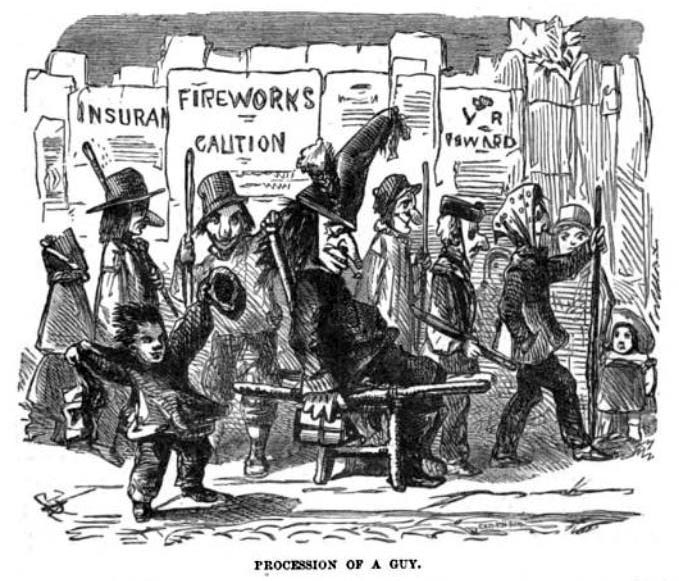On November 5, 1605, by act of Parliament, the populace of London was encouraged to light bonfires and give thanks for the escape of King James I from an assasination attempt. A band of assassins, led by the Catholic Guy Fawkes, plotted to kill the Protestant king by blowing up Parliament while he attended a session. The attempt, scheduled for summer 1605, was delayed when Parliament was adjourned because of plague in London, and had to be replanned for the first meeting on November 5. Some of the conspirators, concerned that Catholic members of Parliament would also be killed, warned several Catholics lords to stay away. One of these, Lord Monteagle, reported the warning letter and his suspicians to the King, who had the cellars under Parliament searched. Both Fawkes and barrels of gunpowder were discovered, and he was arrested before he could light the fuse. Hence the proclamation by Parliament to commorate the date: its members and the King remained alive and well. Fawkes, on the other hand, was interrogated under torture and eventually sentenced to death for treason.
The act remained in effect until 1859, by which time celebration of “Guy Fawkes” day had become a fixed celebration in the English calendar, marked with bonfires and fireworks, and a narrative reference in literature and poetry. Milton discusses it in a youthful poem, and T. S. Eliot uses the phrase “A penny for the Old Guy” as a reflection point in “The Hollow Men”. A child’s biography made Fawkes out as a generally sympathetic rebel, and in the penny dreadfuls of the 1880s, he appears in a role we would now recognize as a counterculture action hero. Diana Wynne Jones’ Chrestomanci series is based on the premise that the Gunpowder Plot had succeded, creating an alternate reality.
Dozens of plays and TV episodes have spun out stories based on the event and its charactersm from Sherlock Holmes to Dr. Who. In some, Fawkes in an archvillain who threatens the established order in a bloody terrorist attack; in others, he is the desparate defender of a suppressed minority who has run out of peaceful options to protect what he believes is important and valuable in life. Bill Cain’s play Equivocation depicts how a troubled Shakespeare, hired to write a play about the plot, struggles to tell an unpopular truth without getting caught.
The events surrounding the Gunpowder Plot are pretty well documented, as historical events go. There’s very little controversy over details of what actually happened. But was Guy Fawkes a hero or a villain? As with many historical questions, that depends on whom you ask.

